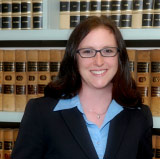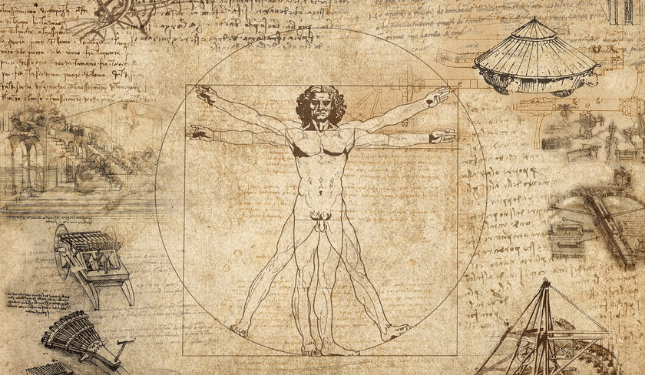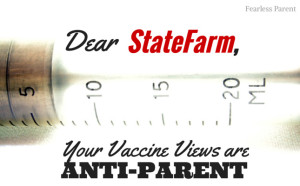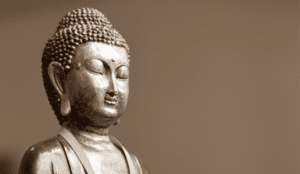by Valerie Borek, Esq.
Our three-part series reviews the many important reasons that we protect religious exemptions to vaccines. In Part 1, we discuss the myriad ways that their denial offends the Constitution. In Part 2, we draw a powerful analogy to forced sterilization to illustrate a very slippery slope when we permit governments to determine who is and isn’t unfit (and unvaccinated). In Part 3, we explore more reasonable steps that can be taken before resorting to the most restrictive and extreme action: the removal of liberty and free choice.
Across the US, legislators are proposing to vaccinate the Vitruvian Man by force. Fear-driven legislative proposals to curtail and eliminate exemptions have been on the table, to date, in thirty-six states. (Read what’s happening in New Jersey, for example.)
There was a time when there was no difference between Science and Religion. In our wisdom we have segregated the quest for knowledge. The cost of this polarization is the threat of sacrificing individual rights a political Clash of the Titans.
In this three part series, I’ll address the oft-heard question: “Why do we have a religious exemption anyway?” Here’s why:
Denying religious exemptions offends the Constitution
#1: THERE ARE NO “FAKERS”
“It’s easier to get an exemption than a shot.”
I’ll give you this: it’s pithy. But what an ignorant and insulting dismissal to such a serious issue.
When has it ever been easy to be in the minority? It’s not easy to be judged, shunned, ridiculed, feared, shamed, pitied, and loathed. It’s not easy to stand up to a White Coat who doesn’t like questions, or a Suit who has proposed guilty-until-proven-legit legislation. It’s not easy to stand your ground when you’re attacked. It’s not easy to spend hundreds or thousands of hours educating yourself on something you know in your heart to be true, for the sole purpose of appeasing and educating others.
It is much easier to dismiss a person with a pithy sound bite rather than face the fact that he might have something to say that will upend your world and change your reality.
So who are the “Fakers?” I won’t claim no one ever exercises a religious exemption for reasons that are not solely religious. That would be absurd. But instead of asking how we can stop the audacious “fraud” of a person standing up for their rights to refuse medical treatment, despite being suppressed by their own elected officials, perhaps we need to truly understand WHY a person would do such a thing in the first place, and look toward removing the root cause of individual noncompliance, rather than impose a blanket elimination of rights of all people.
Fakers are a minority within a minority. In New Jersey, for example, less than 2% of the population claims a religious exemption to vaccines. The boogeyman we fear is less than less than 2%. For this we are going to let a legislature trample on the rights of people we believe “legitimately” exercise religious freedom?
Mississippi’s Supreme Court deemed its state’s religious exemption unconstitutional in 1979 as a 14th Amendment violation of Equal Protection. How did they do that? Discrimination laws are supposed to protect a minority from a negative outcome, but in Mississippi Equal Protection was inverted to “protect” a majority from a minority exercising a fundamental right. A religious exemption, the court argued, “would discriminate against the great majority of children whose parents have no such religious convictions.” This logic and legal analysis was not tested in the US Supreme Court.
Our country, as a representative democracy, was structured in such a way to protect minorities, and allow them the space to breathe that they need for survival. When we deprive that fire of oxygen, we deny all that our country was founded for. Eliminating or substantially burdening exemption rights to the point of elimination, is a systematic silencing of a minority.
Here’s the deal. When we’re talking about eliminating religious exemptions to vaccines, we’re talking about eliminating individual worth. We’re talking mandates. We are forcing a person to submit to an authority, whether governmental or medical. If the only option a person has is to follow orders, he has no free will. I’m just going to lay it out there. States that leave people with no option other than compliance are treating citizens as slaves. They’re stomping on the Bill of Rights. They’re recognizing only the authority of: (1) State; (2) Science; and (3) Religion; in that order. Individuals don’t even rank.
#2: SAYING NO IS A FUNDAMENTAL RIGHT
Consent to medical treatment is a basic foundation of medical ethics. What could be more private and sacred than a person’s body and mind?
States have stricken religious exemptions based on the Establishment Clause of the First Amendment. States cannot favor religion by allowing those in the club to enjoy a privilege not afforded to the general population. Let that sink in for a moment. Courts have ruled it’s a privilege to be able to reject unwanted medical treatment.
If vaccines are safe and effective, why would it be a special privilege to be able to say no? That’s like saying it’s a privilege to be able to say no to eating your favorite food, or watching a sunset, or to remaining silent when being interrogated. Courts are treating a fundamental right–one that is reserved by individuals and subject to infringement only in the most narrowly crafted of circumstances–as if it is a benefit originating with the state and only bestowed at governmental discretion.
No rights are absolute. Neither should any legislation be. We cannot allow governments or states to label our rights as privileges and subsequently write them off.
#3: CON LAW 101 — ENUMERATED POWERS
Government derives power from the people, not the other way around. Americans have forgotten our history. Our Constitution is one of enumerated powers. This means the ultimate authority is the individual, and any power over the individual was granted by the individual. Government was supposed to work for us. The Bill of Rights was a declaration of the boundaries of the power derived from the people.
This is why it is important to allow religious exceptions to vaccine mandates to remain.
It’s important on a personal level so a person can maintain his relationship with his god and spirituality in a manner he finds agreeable. And it’s important on a sociopolitical level to protect against the type of tyranny the Colonists fled in other countries and our country’s founders fought to prevent.
Remember, the Constitution wasn’t a foregone conclusion. The Framers had to convince people to adopt it. They worked hard at it. One of the strongest hold-out arguments against the Constitution, when it was being pitched to Colonists, was the fear that Government would insert itself between a person and their relationship with god. The Bill of Rights was a negotiation to the constitutional contract, which made people feel comfortable ceding some of their god-given, natural soverignty to a central government. If the Constitution had not yielded to religious freedom and rights of conscience, there would be no Constitution.
Religious freedom is the bedrock of this beautiful country. A religious exemption exists because we live in a country where individual freedom is paramount. People flee other countries to come here for this freedom. Protecting rights of conscience permeates the soul of every true American.
#4: UNCONSTITUTIONAL ENTANGLEMENT IN RELIGION
States are proposing to “make it harder” to exercise religious freedom in the face of medical mandates. One way is to require a person to explain their faith and how vaccines violate this devotion.
If your belief is legitimate, why is it a burden to explain it to the state? At the heart of this question is judgment that your truth is not sincere and not good enough. That judgment is unconstitutional entanglement in religion.
How can a government decide what is religious without being entangled in it, in violation of Free Exercise protected by the First Amendment? Will the definition of religion be clear and stable, or will it be a moving target, subject to interpretation? Will a person be considered religious one year but not the next? Will the same actions by two people be judged the same or will context be taken into account?
All of these questions require government employees—your neighbors—to scrutinize your faith and give you permission to exercise a natural right. Under what guidance are they going to make that call?
The government has no right to be the arbiter of whether your relationship with your god is on the up and up. Or to what degree you must practice a belief. Requiring a belief to be judged sincere shifts the balance of power from the people to the government. We are no longer asserting our rights, we are applying for a privilege.
And by the way, where have I heard this question before? Oh yeah… if you have nothing to hide, you have nothing to fear, right?
Stay tuned for Why We Protect Religious Exemptions to Vaccines, Part 2.
 Valerie Borek, Esq has her gloves off on this issue and we are so glad she’s on our team. Valerie has focused her career on empowering parents and strengthening the family. She is proud to be a founding member of the Birth Rights Bar Association. Valerie became involved in birthing rights in 2012 through the encouragement of the midwives that attended her son’s home birth. Check out her blog post here to learn more about what inspired and motivated her to user her legal training to affect positive change in maternity care in the U.S. She lives in Pennsylvania with her partner and their two young boys.
Valerie Borek, Esq has her gloves off on this issue and we are so glad she’s on our team. Valerie has focused her career on empowering parents and strengthening the family. She is proud to be a founding member of the Birth Rights Bar Association. Valerie became involved in birthing rights in 2012 through the encouragement of the midwives that attended her son’s home birth. Check out her blog post here to learn more about what inspired and motivated her to user her legal training to affect positive change in maternity care in the U.S. She lives in Pennsylvania with her partner and their two young boys.













Trackbacks/Pingbacks